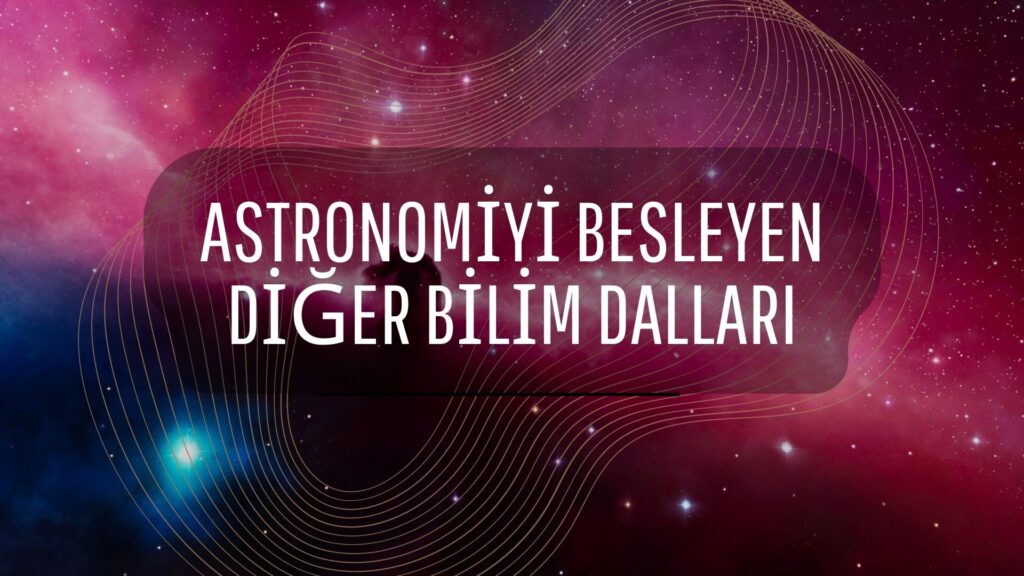Astronomiyi Besleyen Diğer Bilim Dalları
Astronomi, bilinen en eski bilim dalıdır. En eski medeniyetlerin bile yıldızların gökyüzündeki konumu ve hareketleri üzerine çalışmalar yaptıkları günümüzde bilinmektedir. Etimolojik olarak Yunancada yıldız anlamına gelen “astron” ve yasa anlamına gelen”nomos” kelimelerinin birleşmesi ile oluşmuştur. Günümüzde “gökbilim” olarak da anılmaktadır.
Tüm gök cisimlerini ve evrende dağınık halde bulunan yıldızlar arası maddelerin nereden geldiğini, neye evrildiğini, sahip olduğu bileşimleri ve hareketlerini inceleyen bilim dalıdır. Evreni oluşturan maddelerin ve tüm gök cisimlerinin fiziksel ve kimyasal özelliklerini inceleyen astrofizik başta olmak üzere astronomiye yardımcı olan bilim dalları mevcuttur. Bu bilim dallarının en önemli olanlarını birkaç başlık altında inceleyebiliriz:
Astrofizik
“Gök fiziği” ya da “yıldız fiziği” anlamlarına gelmektedir. Astronomi ve fizik dallarının birleşiminden oluşmuştur. Gök cisimlerinin ve gök olaylarının fiziksel ve kimyasal özelliklerini ve yapılarını incelemeye yarayan bilim dalıdır.
Astromatematik
Astronomi ve matematik bilimlerinin oluşturduğu bir alt bilim dalıdır. Bu dal çekim kuvvetine tabi olan gök cisimlerinin yörüngelerini hesaplamaktadır. Gözlem sonucu elde edilen verilen sayısal olarak değerlendirilmesi üzerine çalışırlar. Moleküler gaz bulutları çalışma ortamlarının büyük bölümünü oluşturmaktadır. Astronomi ve kimya bilimlerinin birleşmesi ile oluşmuştur.
Astrokimya
Bu bilim dalı dünya dışında bulunmakta olan elementlerin ve kimyasal maddelerin birbirleri ile olan etkileşimini ve birbirleri üzerindeki tahribatlarını incelemektedir. Güneş sisteminden çok daha geniş alanlarda çalışmaktadır.
Astrobiyoloji
Adından da anlaşılabileceği üzere astronomi ve biyoloji bilimlerinin birleşmesi ile oluşturulmuştur. Disiplinler arası bir bilim olmakla beraber “egzobiyoloji” olarak da isimlendirilmektedir. Evrende yaşamın oluşmasına etki eden biyokimyasal etmenleri incelemektedir. Evrendeki tüm canlıların (mikro boyuttaki canlılar da dahil) kökenini, evrimini inceleyerek geleceği hakkında veriler elde etmektedir.
Arkeoastronomi
Arkeloji biliminin astronomi bilimine katkı saplaması açısından oluşturulmuştur. İnsanların geçmişte gök cisimlerini nasıl incelediklerini ve verileri nasıl yorumladıklarını görmek üzere arkeolojik kalıntılar ile çalışmalar yaparlar.
Astrojeoloji
Jeoloji yer şekillerini inceleyen bilim dalıdır. Astronomi ve jeoloji bilimlerinin birleşmesi ile ise astrojeoloji bilimi oluşmaktadır. Bu bilim dalı gök taşları, doğal uydular, gezegenler, astreoitler, kuyruklu yıldızlar gibi oluşumların yer şekillerini incelemek üzere çalışmalar yaparlar. Bunun yanı sıra meteorlar üzerinde detaylı incelemelerde bulunmaktadırlar.

Other Sciences Feeding Astronomy
Astronomy is the oldest known science. It is known today that even the oldest civilizations studied the position and movements of the stars in the sky. Etymologically, it is formed by combining the Greek words “astron” meaning star and “nomos” meaning law. Today it is also known as “astronomy”.
It is the science that studies all celestial bodies and the interstellar matter scattered in the universe, where it came from, what it evolved, its compositions and movements. There are branches of science that help astronomy, especially astrophysics, which examines the physical and chemical properties of the materials that make up the universe and all celestial bodies. We can examine the most important of these branches of science under a few headings:
Astrophysics
It means “sky physics” or “star physics”. It is a combination of astronomy and physics branches. It is a branch of science that examines the physical and chemical properties and structures of celestial bodies and celestial events.
Astromathematics
It is a sub-discipline of astronomy and mathematics. This branch calculates the orbits of celestial bodies subject to gravitational force. They work on the numerical evaluation of the data obtained as a result of observation. Molecular gas clouds make up the majority of working environments. It was formed by the merger of astronomy and chemistry sciences.
Astrochemistry
This branch of science examines the interaction of elements and chemical substances with each other and their destruction on each other. It works in areas much larger than the solar system.
Astrobiology
As the name suggests, it was formed by the merger of astronomy and biology sciences. Although it is an interdisciplinary science, it is also called “exobiology”. It examines the biochemical factors that affect the formation of life in the universe. By examining the origin and evolution of all living things in the universe (including micro-dimensions), he obtains data about his future.
Archeoastronomy
It was created in terms of the contribution of archeology to the science of astronomy. They work with archaeological remains to see how people studied celestial bodies in the past and how they interpreted the data.
Astrogeology
Geology is the science that studies landforms. With the merger of astronomy and geology sciences, the science of astrogeology is formed. This branch of science studies the landforms of formations such as meteorites, natural satellites, planets, asteroids, comets. In addition, they make detailed studies on meteorites.